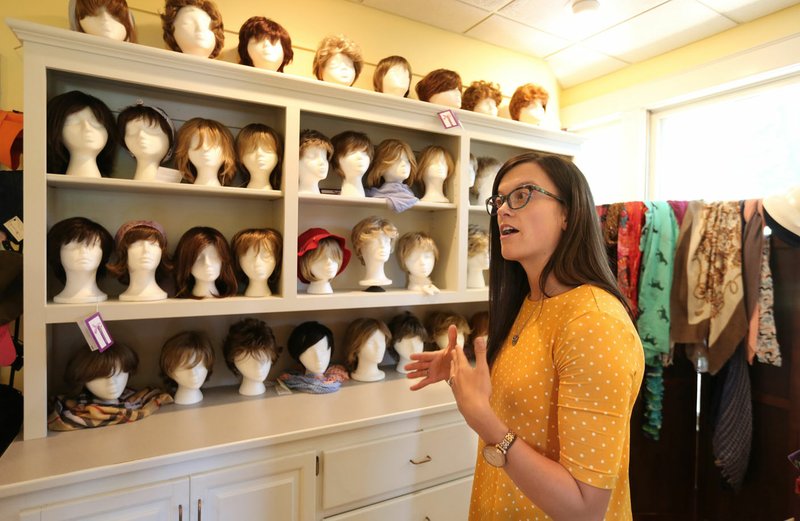FAYETTEVILLE -- Cancer patients will be able to receive support services at a new facility officials plan to start building by next spring.
Washington Regional Medical Center is developing a cancer support home on 4.4 acres east of 378 E. Longview St. The site is near Brookstone Assisted Living Community and Washington Regional's Willard Walker Hospice Home. The new building will replace the home at 1101 N. Woolsey Ave. that opened in 1995. Washington Regional also operates a center at 2706 E. Central Ave. in Bentonville.
Cancer patients don't pay to stay overnight at a cancer support home while they are in town for treatment. They can also go there for counseling, health education, support groups and the boutique that has wigs, hats, scarves and post-mastectomy supplies such as bras and breast prostheses. "Patient navigators" may also go with patients to appointments, and help them understand diagnoses and treatments, among other support services. The new home will offer all of the same services, said Jaclyn Keeter, director of development and outreach services for Washington Regional.
"We have done as much as we can with the facility that we have," Keeter said. "We've operated it probably long past its life cycle for what we use it for. The building is beautiful. It's great, but it was never designed to be a bed and breakfast for very, very sick people."
The building was originally a private home, she said. It has three rooms upstairs and one room downstairs for overnight guests. The 92-year-old house doesn't have an elevator, and walking upstairs can be difficult or impossible for some cancer patients, Keeter said.
Designs for the new home are almost completed, said Tim Hudson, Washington Regional Medical Foundation executive director.
The new home will have up to 10 bedrooms and an elevator, he said.
Services are largely paid for with grants and donations. For example, nonprofit organization Susan G. Komen pays for the salaries of the two patient navigators.
Vicki Cowling, director of mission services at the organization's Springdale office, said it's common for the navigators to see patients driving three hours or so from rural parts of Arkansas for treatment.
Navigators help patients coordinate appointments and apply for financial assistance. One navigator is bilingual and helps interpret for Spanish-speaking patients, Cowling said.
The facility serves only adults and will take patients from any medical provider.
"I would say Highlands patients make up the highest percentage of people staying at the cancer support home," said Kathey Rhoads, chief operating officer at Highlands Oncology Group.
Highlands saw 14,300 patients in 2018 at its three clinics in Fayetteville and Rogers, she said. The oncology group broke ground in November on a new clinic off Don Tyson Parkway in Springdale. The expansion is needed because Highlands has run out of space for how many patients it serves. Patients often come from Fort Smith, Mountain Home and Missouri and Oklahoma, Rhoads said.
The new Springdale clinic will offer chemotherapy, physical therapy, occupational therapy and several other services, Rhoads said in an email.
Gary Tuller, 67, of Prairie Grove stayed at Cancer Support Home for about eight weeks in 2014 while he was treated for brain and lung cancer five days a week at Highlands, he said. He and his wife lived about 115 miles away in Russellville at the time and would stay at the support home during the week and go home on weekends.
"We felt like it was our second home," he said.
Tuller said that although he didn't take part in any of the support groups, he got to know other cancer patients and their families.
"It's a horrible disease to deal with, but your life can be made so much better by being around people who understand," he said.
The home is an asset to the community but needs more space, Tuller said.
Kelsey Brock, program coordinator at Cancer Support Home, said the staff has had to turn away patients because they couldn't walk upstairs to a room and the single ground-level room was occupied. She said the layout of the home can be challenging. For example, private counseling sessions are in the sunroom, which is where the entrance is from the wheelchair ramp outside. If someone in a wheelchair needs to go in or out of the house, they have to interrupt the counseling session.
Brock also pointed out patients use the downstairs bathroom as a dressing room to try on mastectomy bras and prosthetic breasts. The new home will have two designated dressing rooms.
Two of the overnight rooms have private bathrooms, and two have shared bathrooms. The new home's bedrooms will all have private bathrooms, Keeter said.
"The nature of treatment or surgery prep doesn't always encourage shared bathroom opportunities," she said.
Each of the bedrooms will also have private balconies, Hudson said. The staff felt the balconies were important because it makes it easier for patients to spend time outside when it can otherwise be difficult for them to get out, he said.
Washington Regional doesn't have an exact cost estimate for the new cancer support home, but has begun raising money, said Nancy Cozart, director of development and gift planning. Hospital officials haven't decided what they will do with the building on Woolsey Avenue. Washington Regional is in a long-term lease with Washington County for the building, and it will not be torn down, she said.
Natalie Hardin, spokesman for Washington Regional, said the lease began in 1988 and will end in 2063.
Metro on 06/17/2019
